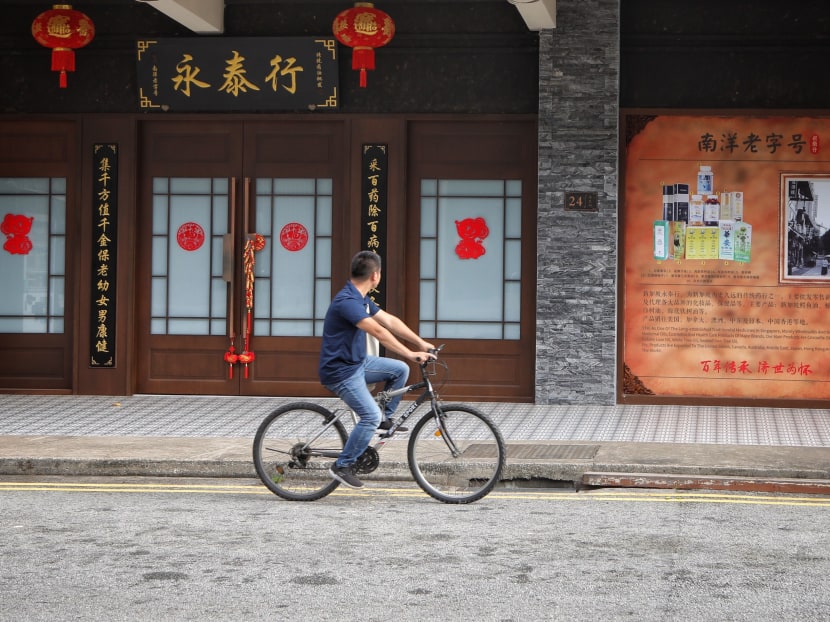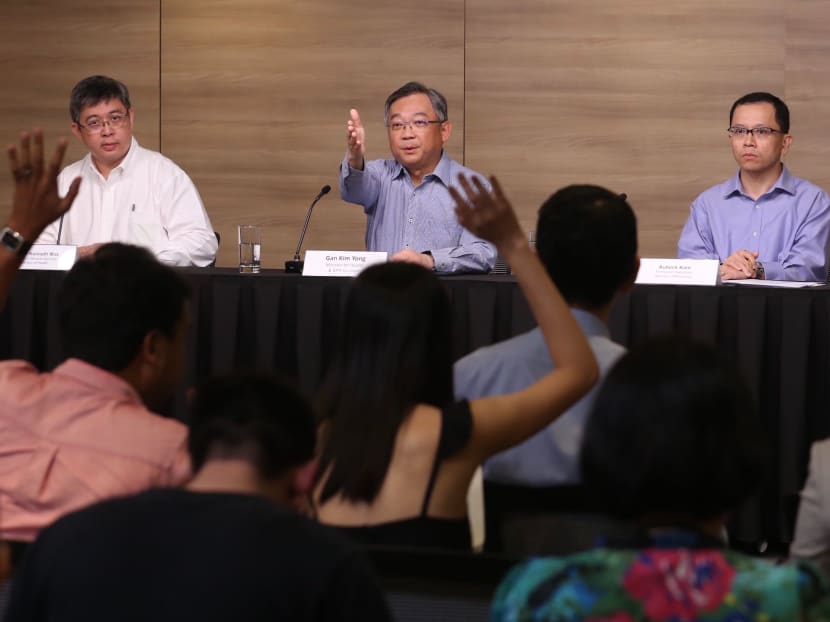Novel coronavirus: Singapore reports first local transmissions, 4 cases linked to Jalan Besar shop visited by Chinese tour groups
SINGAPORE — There are six new cases of the novel coronavirus in Singapore, four of whom are linked to one health product shop at Cavan Road, off Lavender Street, the Ministry of Health said on Tuesday (Feb 4).

Of the four locally transmitted cases, two are sales employees at Yong Thai Hang, a health product shop (pictured) located off Lavender Street, while another is a tour guide who took Chinese tourists to the shop.
SINGAPORE — There are six new cases of the novel coronavirus in Singapore, four of whom are linked to one health product shop on Cavan Road, off Lavender Street, the Ministry of Health said on Tuesday (Feb 4).
This brings the total number of cases here to 24 — the third-highest in the world after China and Thailand.
Of the six cases announced by MOH on Tuesday, four represent Singapore's first locally transmitted cases.
The four are:
-
Three Singapore residents (two citizens and one permanent resident) who had had contact with tourists from China — two are sales employees at Yong Thai Hang, a health product shop off Lavender Street that serves mainly Chinese tourists, while another is a tour guide who took the Chinese tourists to Yong Thai Hang.
-
One is an Indonesian, who is a foreign domestic worker for one of the infected Yong Thai Hang sales employees.
The shop was closed when TODAY visited it on Tuesday.
The other remaining two new patients are Singaporeans. They are part of the group of 92 people who were evacuated from Wuhan, China on a Scoot flight on Jan 30.
The earlier 18 confirmed cases here were all imported, comprising 16 Chinese nationals and two Singaporeans who had all travelled recently to Wuhan, the capital of Hubei province where the novel coronavirus originated. It has spread to 27 countries and killed more than 420 people, mainly Chinese nationals.
MOH said: “Although four of these cases constitute a local transmission cluster, there is as yet no evidence of widespread sustained community transmission in Singapore.”
Speaking at a media briefing on the new patients, Health Minister Gan Kim Yong elaborated on the difference between a local transmission cluster and community spread: “The main difference is that for this cluster, we could identify all the sources that were involved. The source was a group of mainland China tourists. We have their names, we have an indication of the patients who fell ill.
“Therefore we could identify the specific source… If we are able to ringfence this particular cluster, we can control the spread. Therefore, we say it is a limited local transmission.”
But if there are multiple clusters and the Government cannot determine the source, that is when it would be labelled a widespread community transmission.
“When that happens, we will move to Dorscon (Dors condition) Orange," he said, referring to Singapore's Disease Outbreak Response System (Dors), a crisis management plan.
"At that point, we will need to consider measures to reduce human-to-human interactions, such as cancelling mass gatherings, suspending schools, paring down non-essential care services and introducing further infection control and monitoring measures, to slow the spread.”

At the moment, Singapore is at Dors condition or Dorscon Yellow, signifying that the virus is severe and can infect from person to person, but is chiefly occurring outside Singapore.
The next step up is Dorscon Orange, whereby the virus is spreading in Singapore but not widely, and it is being contained.
As for the Indonesian foreign domestic worker who was infected by her employer, Associate Professor Kenneth Mak, director of medical services at MOH, said that the transmission occurred in a closed controlled setting.
“At this time, we don’t see other cases not linked to China. That is why we say we don’t see evidence of community spread,” Assoc Prof Mak said.
MOH said that pending confirmation from Chinese authorities, the Chinese travellers who visited Yong Thai Hang are from Guangxi and two of them have tested positive for the coronavirus.
They arrived in Singapore from China on Jan 22, 8pm and visited the shop as well as other places on Jan 23.
The tour group then went to Malaysia from Jan 24 to 26 and returned to Singapore on Jan 27 via the Woodlands Checkpoint at 3am and left Singapore through Changi Airport Terminal 1 at 6am.
On Jan 31, the authorities here imposed travel restrictions for all travellers who came from mainland China, expanding an earlier directive that initially restricted only those who travelled to Hubei.
Assoc Prof Mak said that the tour guide who led the group to Yong Thai Hang reported that some tourists in the group were coughing and sneezing during their trip. Efforts are being made to trace where the group had been while in Singapore.
Mr Gan said that MOH has started contact-tracing for the latest cases, so as to ringfence the local transmission cluster and limit local spread.
“As I have mentioned in Parliament, this is not unexpected. It is a scenario that we have prepared for and are ready to manage,” he said.
In Parliament on Monday, Mr Gan delivered a ministerial statement in which he said that Singapore has to be ready for local community spread of the coronavirus, or for a mutation of the virus.
MOH said that as of 12pm on Tuesday, 289 suspect cases here have tested negative for the virus while test results for another 20 cases are pending.
Besides Singapore and China, eight other countries and Hong Kong have seen locally transmitted cases.

THE SIX NEW CASES
Case 19
-
A 28-year-old female Singapore permanent resident who works at Yong Thai Hang
-
She is warded in an isolation room at the Singapore General Hospital (SGH).
-
She developed a sore throat and fever on Jan 29 and sought treatment at a clinic on the same day.
-
She went to Tan Tock Seng Hospital on Jan 30 but was discharged when x-ray results showed that she did not have pneumonia.
-
She said she had not left her home at Jalan Bukit Merah from Jan 31 to Feb 2.
-
On Feb 3, she went to SGH, where she was diagnosed with pneumonia and classified as a suspect case and immediately isolated.
-
She tested positive for the novel coronavirus on Feb 3 after 11pm.
Case 20
-
A 48-year-old female Singaporean who lives in Hougang and is a colleague of Case 19 at Yong Thai Hang.
-
She is warded at the National Centre for Infectious Diseases (NCID).
-
She reported that pneumonia symptoms started developing on Jan 25.
-
On Feb 3, she went to NCID and was classified as a suspect case and immediately isolated since she was a colleague of Case 19.
-
She tested positive for the coronavirus on Tuesday morning.
Case 21
-
A 44-year-old Indonesian who is the domestic helper of Case 19.
-
She is warded in an isolation room at SGH.
-
She started developing symptoms on Feb 2.
-
As she was a close contact of Case 19, she was admitted to SGH’s Emergency Department on Feb 3.
-
Test results on Tuesday afternoon confirmed that she had been infected by the virus.
Case 22 and 23
-
Both are Singaporeans who were evacuated from Wuhan on Jan 30.
-
They did not show any symptoms when they boarded the Scoot flight and were put under quarantine upon landing in Singapore.
-
Both tested positive for the virus on Feb 3, although they are still not showing any symptoms.
-
They are now warded in an isolation room in the NCID.
Case 24
-
A 32-year-old female Singaporean who was the tour guide who took the tour group to Yong Thai Hang
-
She was not showing any symptoms when she went to the NCID on Feb 3, where she was immediately isolated.
-
Test results on Thursday afternoon confirmed that she had been infected with the virus.
Malaysia announced on Thursday a confirmed case, a 42-year-old Malaysian.
He was in Singapore from Jan 16 to 23 to attend a business meeting, which included Chinese nationals, at the Grand Hyatt Hotel on Scotts Road.
He developed symptoms after his return to Malaysia and tested positive for the coronavirus on Feb 3.
MOH said it has started epidemiological investigations and contact-tracing to identify individuals who had close contact with these cases.
It is also reaching out to individuals who have had recent close contact with people who travelled to China, similar to the four local transmission cases.
The Government is now rolling out more measures to guard against transmission in schools, workplaces and eldercare facilities.
“It is possible that there could be broader community spread despite our best efforts. Should that happen, we will consider additional measures to reduce human-to-human interactions, such as cancelling mass gatherings, suspending schools, and paring down non-essential care services, to slow the spread of the disease,” MOH said.













